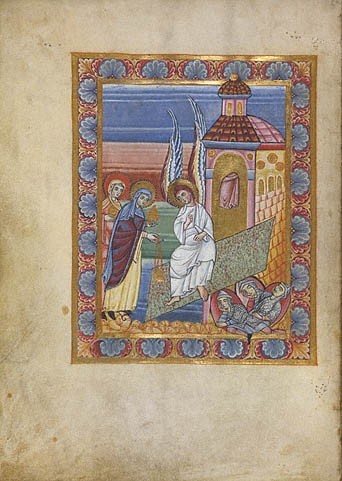 The message of Easter is much more important than its chronology. Still, people often ask me questions about chronology in the Gospels. In my earlier post, I answered questions related to the date of Easter and the apparent difference between the chronology found in John and in the Synoptic Gospels. Today, I answer a few questions related to the "three days and three nights."
The message of Easter is much more important than its chronology. Still, people often ask me questions about chronology in the Gospels. In my earlier post, I answered questions related to the date of Easter and the apparent difference between the chronology found in John and in the Synoptic Gospels. Today, I answer a few questions related to the "three days and three nights."
Why is the resurrection described happening after “three days and three nights”? If Jesus died on Friday afternoon, and the tomb was empty on Sunday morning, isn’t that only a day and a half?
The phrase “three days and three nights” is idiomatic, and means something like “after a few days” or even “the day after tomorrow.” Greek writings, especially those written by Jews, used three phrases interchangeably: "three days and three nights" (τρεῖς ἡμέρας καὶ τρεῖς νύκτας, Matt 12:40), "after three days" (μετὰ τρεῖς ἡμέρας, Matt 27:63, Mark 8:31, others), "in three days" (ἐν τρισὶν ἡμέραις, Mark 14:58, John 2:19) and "on the third day" (τῇ τρίτῃ ἡμέρᾳ, Matt 17:23, 1 Cor 15:4). I have seen such phrases used interchangeably in the Gospels, in Josephus (Ant 3.78-79, 7.280-281), and in Esther 4:16-5:1. Esther's fast is described as three days and nights (ἐπὶ ἡμέρας τρεῖς νύκτα καὶ ἡμέραν), but it ends "on the third day" (ἐν τῇ ἡμέρᾳ τῇ τρίτῃ). In English, we also describe events within 24 hours as two days, if they take place on two calendar days. Clearly, the gospel authors tell us that Jesus died on Friday and was raised on Sunday, but they also used the normal language of their time to describe this period as "three days" or even "three days and three nights." So they did not see any problems between these different ways of reporting the time. This can be surprising to modern people, since we are often nmuch more precise in our descriptions of time and chronology.
Why are the three days so significant in the Gospels?
The phrase is mentioned 26 times in the NT, both before and after the resurrection, suggesting there is some significance to the time. On two occasions, Jesus makes some reference to its meaning. First, Jesus alludes to Jonah:
"For just as 'Jonah was in the belly of the sea-monster three days and three nights,' so also the Son of Man will be in the heart of the earth for three days and three nights." (Matt 12:40, quoting Jonah 1:17)
Why this connection? Jesus was quite different from Jonah in some important ways. After all, Jonah is the prime example of a disobedient prophet! But the comparison does not require Jesus to be like Jonah in every way. Both Jonah and Jesus were prophets who preached a message of repentance. (Yes, Jesus is more than a prophet, but he is not less than a prophet; see Mk 6:4). But the comparison hinges on their similar experience. Jonah's time in the belly of the sea-monster was compared to being in the grave (Jonah 2:2), and God's rescue of Jonah was described as bringing "my life up from the pit" (Jonah 2:6). Jesus was actually in the grave, and the New Testament normally describes his resurrection as God raising him from the dead (Acts 3:15, 4:10, and many others; see also the repeated passive verbs "he was raised" and "he will be raised").
On another occasion, Jesus alludes to another OT passage when he describes the three days:
"… and after scourging [the Son of Man], they will kill him, and on the third day he will rise (τῇ ἡμέρᾳ τῇ τρίτῃ ἀναστήσεται)." (Luke 18:33)
Notice the similarity to this passage from an Old Testament prophet:
"... for he has seized us and he will heal us, he struck and will bandage us; he will heal us after two days, on the third day we will rise (τῇ ἡμέρᾳ τῇ τρίτῃ ἀναστησόμεθα) and live before him." (Hosea 6:1-2 LXX)
Because this is an allusion, not a quotation, it is little less clear what Jesus means when he refers to Hosea. In Hosea 6, God's people describe how God punished them for their sin but is now restoring them (the "third day" is probably metaphorical in Hosea). While Jesus does not work all of this out explicitly, I think Jesus is making a connection between Israel suffering for their sins, and Jesus suffering for their sins. This fits with Jesus' Son of Man teaching on other occasions: "The Son of Man came... to give his life a ransom for many" (Mk 10:45). But after suffering, God will raise him on the third day.
If I am reading Jesus correctly here, there is a similarity between Jesus' references to Jonah and Hosea as he describes the three days. Both Jonah and Israel are described as being punished for their own sins for three days; but then God rescues them. By emphasizing the three days, Jesus is explaining that his death also serves as a punishment for sins, although it is for the sins of others. Isaiah 53, a prophetic oracle often used by New Testament authors to describe Jesus, explains more clearly what Jesus implied: "He was wounded for our transgressions, crushed for our iniquities... He would render himself as a guilt offering... He himself bore the sin of many" (Isa 53:5-12). But on Sunday, on the third day, he arose.
Χρίστος ἀνέστη! Ἀληθῶς ἀνέστη! (Christ arose! Truly Christ arose!)
 Biola University
Biola University
.jpg)


.jpg)